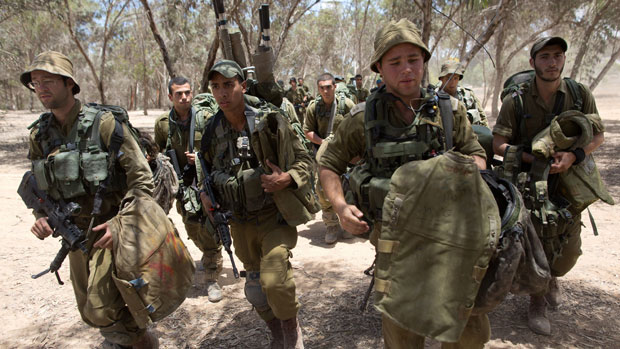What can Israel gain from a Gaza ground offensive?
Defeat of Hamas may be off the cards, but Israel hopes to achieve a more limited victory

A free daily email with the biggest news stories of the day – and the best features from TheWeek.com
You are now subscribed
Your newsletter sign-up was successful
Yesterday afternoon, a "comprehensive ceasefire" between Israel and Hamas seemed imminent. Many commentators were therefore caught off guard when, a few hours later, the Israeli prime minister Benjamin Netanyahu announced a ground offensive in Gaza.
Tanks and soldiers were being sent to the Gaza Strip to deal "a significant blow to Hamas", Israeli officials said.
What does Israel hope to achieve by sending troops into Gaza?
The Week
Escape your echo chamber. Get the facts behind the news, plus analysis from multiple perspectives.

Sign up for The Week's Free Newsletters
From our morning news briefing to a weekly Good News Newsletter, get the best of The Week delivered directly to your inbox.
From our morning news briefing to a weekly Good News Newsletter, get the best of The Week delivered directly to your inbox.
Israel's first ambition is to destroy tunnels constructed by Hamas and other groups, which they believe are being used by fighters to infiltrate Israel and bring in supplies from Egypt.
Yesterday morning, the Israeli Defence Force claimed to have intercepted 13 Palestinian militants who emerged from a tunnel between Kerem Shalom and Kibbutz Sufa, to the east of the Gaza Strip. The Gazan fighters were repelled, but the destruction of similar tunnels to prevent further incursions became one of the primary motivations for the current ground operation.
The BBC's Kevin Connolly in Jerusalem says that in sending troops and tanks into Gaza, Israel may also hope to "improve its military position" in advance of any prospective ceasefire deal.
What are the risks of a ground operation?
A free daily email with the biggest news stories of the day – and the best features from TheWeek.com
Gaza is well defended with "significant underground infrastructure and a number of relatively advanced anti-tank missiles", says BBC diplomatic correspondent Jonathan Marcus.
In defending Gaza, Palestinian fighters will try to inflict casualties and also seize soldiers to act as bargaining chips.
But the biggest risk to Israel is the potential diplomatic fallout from killing civilians, Marcus says. Civilian deaths could set a timeline for the assault since "casualties will prompt ever greater international concern and pressure to halt any operation within as short a time period as possible".
What happened last time Israel went in to Gaza?
The last Israeli ground assault on Gaza was a "victory for Hamas", says The Guardian. While Israel was the winner in a military sense, Hamas "defended the territory effectively" and wound up with significant international support, including political backing from Egypt and financial aid from Qatar. However, the political and economic advantages were short-lived, and many within Gaza considered the loss of life too great a cost for such paltry gains.
What does Hamas want from the latest conflict?
Before it agrees to a ceasefire, Hamas "reasonably" wants prisoners who were arrested after the abduction and killing of three Yeshiva students to be released, the Guardian says. It also wants Israel to lift the economic blockade of Gaza.
But "unreasonably" Hamas wants to lay the blame for the current violence with Israel, even though "the evidence suggests that on this occasion it provoked that attack", the Guardian says.
-
 The environmental cost of GLP-1s
The environmental cost of GLP-1sThe explainer Producing the drugs is a dirty process
-
 Greenland’s capital becomes ground zero for the country’s diplomatic straits
Greenland’s capital becomes ground zero for the country’s diplomatic straitsIN THE SPOTLIGHT A flurry of new consular activity in Nuuk shows how important Greenland has become to Europeans’ anxiety about American imperialism
-
 ‘This is something that happens all too often’
‘This is something that happens all too often’Instant Opinion Opinion, comment and editorials of the day
-
 Epstein files topple law CEO, roil UK government
Epstein files topple law CEO, roil UK governmentSpeed Read Peter Mandelson, Britain’s former ambassador to the US, is caught up in the scandal
-
 Iran and US prepare to meet after skirmishes
Iran and US prepare to meet after skirmishesSpeed Read The incident comes amid heightened tensions in the Middle East
-
 Israel retrieves final hostage’s body from Gaza
Israel retrieves final hostage’s body from GazaSpeed Read The 24-year-old police officer was killed during the initial Hamas attack
-
 China’s Xi targets top general in growing purge
China’s Xi targets top general in growing purgeSpeed Read Zhang Youxia is being investigated over ‘grave violations’ of the law
-
 Panama and Canada are negotiating over a crucial copper mine
Panama and Canada are negotiating over a crucial copper mineIn the Spotlight Panama is set to make a final decision on the mine this summer
-
 Why Greenland’s natural resources are nearly impossible to mine
Why Greenland’s natural resources are nearly impossible to mineThe Explainer The country’s natural landscape makes the task extremely difficult
-
 Iran cuts internet as protests escalate
Iran cuts internet as protests escalateSpeed Reada Government buildings across the country have been set on fire
-
 US nabs ‘shadow’ tanker claimed by Russia
US nabs ‘shadow’ tanker claimed by RussiaSpeed Read The ship was one of two vessels seized by the US military